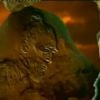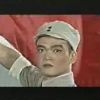
Illustration:
ill. 4.15
Date:
2008
Genre:
comic, cartoon, online source
Material:
online comic, colour
Source:
DACHS 2008 Foolish Old Man, Children’s Comic, Heidelberg catalogue entry
Inscription:
1 愚公门前两座山,王屋山和太行山。家人出门要绕行,绕得又气又是恼。2 愚公对着全家说:一定要移走山两座! 3 你挖土来我挑担,土石运到渤海边。
Keywords:
Foolish Old Man, children, Lao sanpian, Mao´s words, Mao´s writings, Three Old Articles,Three Constantly Read Articles, cartoon, comic, education
The Foolish Old Man in an Educational Online Comic for Children (Yu gong yi shan: You'er huabao 愚公移山: 幼儿画报)
Mao is not always mentioned as the (secondary) source of the “old Chinese legend” which originally appears in the writings of the Liezi. This annihilation may be systematic, to an extent: the renowned Hanyu Da Cidian (汉语大辞典), an exhaustive twelve-volume Chinese dictionary first published in 1990, mentions the story of the Foolish Old Man as a quotation from the Liezi, then gives further sources from the Tang, Song, Ming, and Qing dynasties. No connection is made to Mao’s Three Articles version of the story, however.
Other, more recent, versions of the story point in a similar direction: a 2008 children’s cartoon published by Sina on its baby pages, replicates the Liezi story (inclusive of the inquisitive wife which Mao had left out to make his hero, the old man, more prominent). On the other hand, it includes a gloss for parents replicating the Maoist demand for “living study and application” (活学活用 huoxue huoyong), which grew to such enormous proportions during the Cultural Revolution.
It reads: “After parents tell this proverbial story of the “Foolish Old Man Who Moved Mountains” to their children, they should connect it to things that have happened in their children’s lives. They should lead the children in learning from the Foolish Old Man: in whatever they do, they should not be afraid of difficulties. When they encounter difficulties, they should at first think hard about possible solutions, and when they have come up with a solution they should immediately put it into practice; in whatever one does, one should be perseverant and unswerving: this is how, in the end, one will be successful.” (DACHS 2008 Foolish Old Man, Children’s Comic)






































